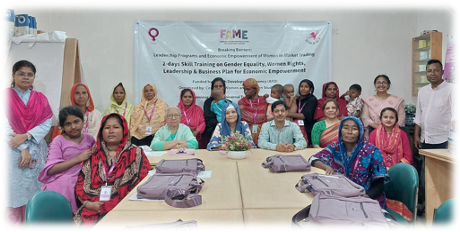Breaking Barriers: Leadership Program and Economic Empowerment of Women in Market Trading
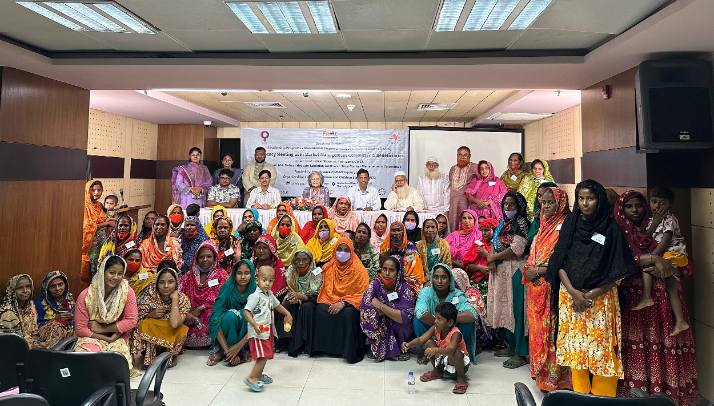
Introduction
On a journey to equip women traders with the skills, confidence, and networks necessary to become effective leaders in their communities and beyond, CWCS started the journey of “Breaking Barriers: Leadership Programs and Economic Empowerment of Women in Market Trading” in Karwan Bazar, Dhaka city. It is a one year project started in May 2025 which aims to address the systemic barriers that have historically hindered women's leadership potential, providing a structured environment where young women can learn, grow, and thrive. By fostering a culture of empowerment and resilience, this initiative seeks to create a new generation of women leaders who are not only capable but also committed to driving social change. The main objectives are to provide leadership training to women traders and at the same time provide them with necessary materials and equipment so that they can enhance their existing market trading and acquire better economic empowerment.
This programme is under the project FAME Feminism: Action and Mobilisation for an Inclusive Economy. The FAME project is a global initiative funded by the French Development Agency (AFD) and the French Ministry of Europe and Foreign Affairs under the Support Fund for Feminist organisations. Running from 2024 to 2027, the project is implemented in Bangladesh by the Dhaka Women Chamber of Commerce & Industry (DWCCI) as part of a consortium led by GERES in collaboration with the South Asian Women's Development Forum (SAWDF).
Project area: Karwan Bazar, Dhaka.
Targeted beneficiaries
The targeted group is women in market trading. About 50 women will be identified who are involved in various income earning activities at the marketplace alongside with men. They will be economically empowered with the necessary materials and equipment to enhance their existing business enterprises. Moreover, the leadership training will give them the power to face any challenges and to approach the local authorities to solve their problems they encounter at the market place.
Project activities to be undertaken:
● Project staff orientation meeting to be organized to orient the project staff about the overall project goal, activities and their role and responsibilities.
● Identification of 50 women in market trading who are involved in various income activities at the marketplace alongside with men.
● Advocacy meeting on women's economic empowerment in market trading with market management committee at marketplace will be organized to aware the members of the market management committee that women need secured space to carry out their economic activities free from harassment and encroachment.
● Training for women in market trading to strengthen their leadership and economic empowerment will be conducted so that women acquire leadership skills to gain recognition and establish their rights as women as well as be empowered economically when they acquire enhanced and secured trading.
● Women's Day Observation on 8 March 2026 will be celebrated to aware women about their rights as workers with participation from women rights organizations and other key stakeholders.
● The 50 beneficiary women traders will receive necessary materials and equipment to enhance their existing trading. It will be attended by members of the market management committee, law enforcement agencies and other influential stakeholders to introduce the women beneficiaries. In the process, women traders will be welcomed in the market place and gain recognition, self-respect and dignity.
● Continuous monitoring will be undertaken, especially to foresee that women beneficiaries do not face any problems in their daily economic activities, have a space in the market to make their work environment safe and free from harassment by maintaining regular liaison with the Market Management Committee members and support from the law enforcement officials.
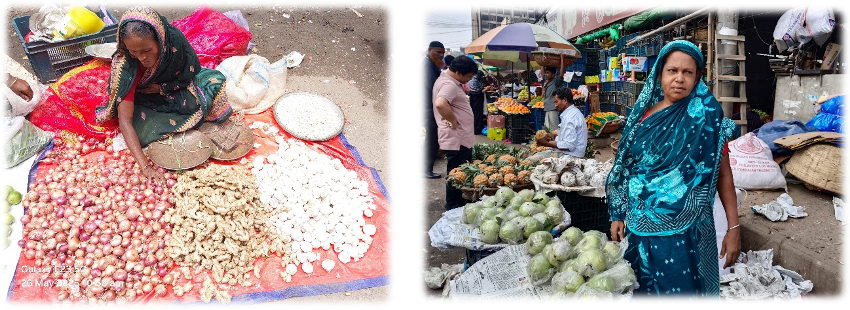
Activities being implemented:
● Baseline survey of Women in Market Trading at Karwan Bazar, Dhaka
Baseline survey of 60 women in market trading was completed with the women in market trading from diverse categories namely selling vegetable, fish & dry fish, tea, betel leaf, cigarettes, fresh juice, fish oil, fruit, cooked rice etc.
Given below the number of women involved in different types of market trading:
|
Type of market trading |
No of women traders |
|
Vegetable |
32 |
|
Different types of spices |
6 |
|
Fish |
4 |
|
Dried fish |
2 |
|
Fish oil and scales |
4 |
|
Fruits |
2 |
|
Fresh fruit juice |
1 |
|
Tea stall, betel leaf, cigarette |
7 |
|
Handmade flour bread |
1 |
|
Cooked rice & curry |
1 |
|
Total |
60 |
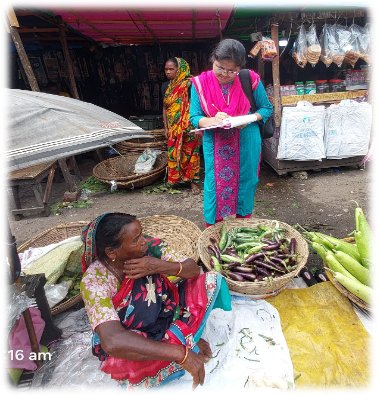
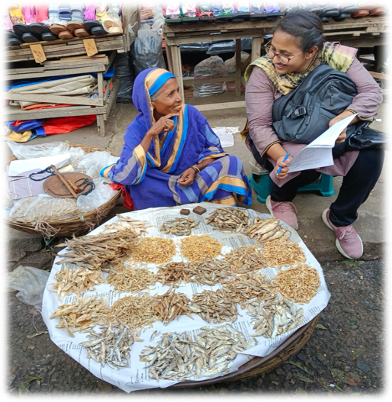
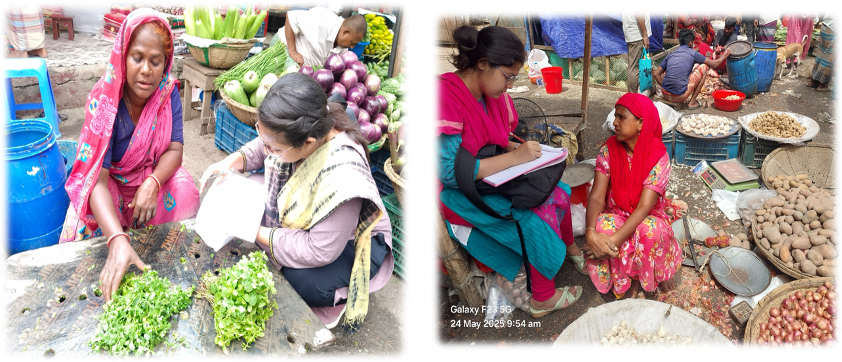
Quotes from the women traders during the baseline survey:
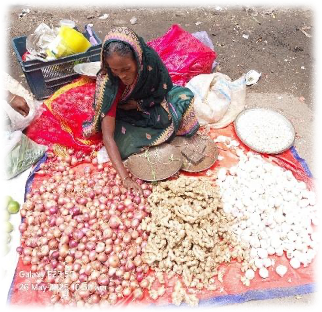
Nasima (40 years) involved in selling different types of spices said, “I used to sit in the balcony of the market building for 20 years but when I was evicted from that place, I am now sitting here by the roadside. No one ever came to see us or inquired about our condition for the long time I have been here.”
Falani (58 years) involved in selling fresh fruit juice said, “Sometimes people come and take our information like you but then they do not come back with any support or help.”
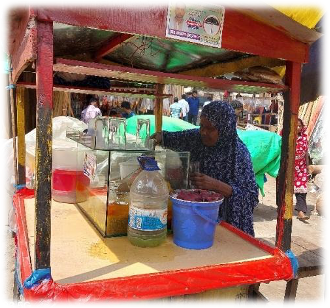
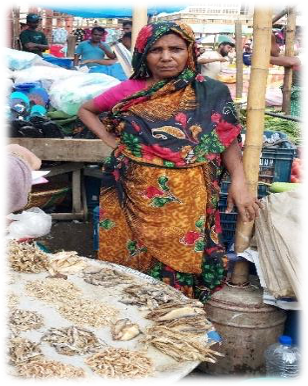
Aklima Khatun (57 years) involved in selling dried fish who was interviewed earlier mentioned, “Women traders rarely sit in the shaded marketplaces for trading; women are mostly in the open area. Sitting in the open place is more flexible for women than sitting in the shaded place as the men traders try to dominate them in those places.”
Akhi, a 40-year-old widow, involved in selling tea, betel leaf & cigarette said, “The job of beauty parlour was demanding but it was not possible for me to struggle alone by balancing the demands of work and motherhood. That is the reason I left that work and am now involved with this trading business which is not well-enough but still I can balance to maintain my family and earn something for a livelihood.”
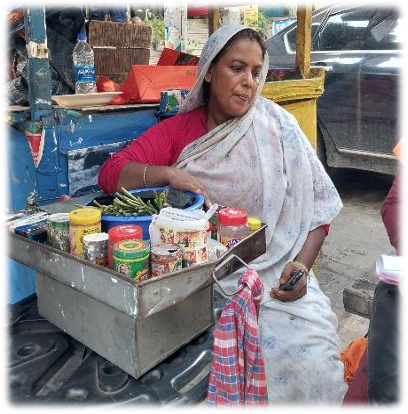
● Advocacy meeting on women's economic empowerment in market trading with market management committee and beneficiary women traders
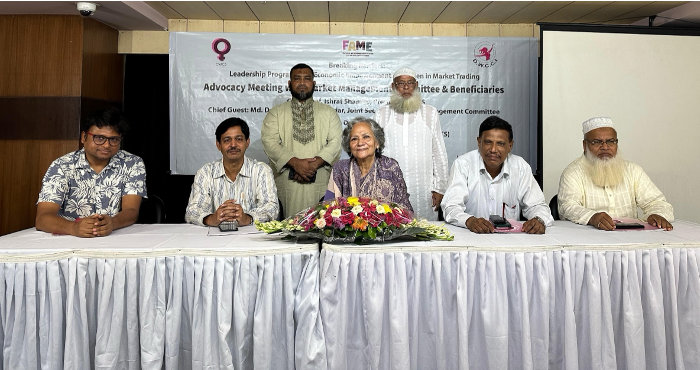
Organized an Advocacy Meeting with the Market Management Committee and Beneficiary Women Traders of Karwan Bazar on Tuesday 22 July 2025. The event took place at the Tawfia Aziz Khan Seminar Hall, The Daily Star Centre, which was attended by the key stakeholders of the project including the 50 participants who are women in market trading, 5 Market Management Committee members, Md Nasir Uddin, Project Coordinator of the FAME Project representing the Dhaka Women Chamber of Commerce and Industry (DWCCI) and Shuvom Khan, Creative Lead of The Daily Star. The meeting was chaired by Prof. Ishrat Shamim, President, Centre for Women and Children Studies (CWCS).
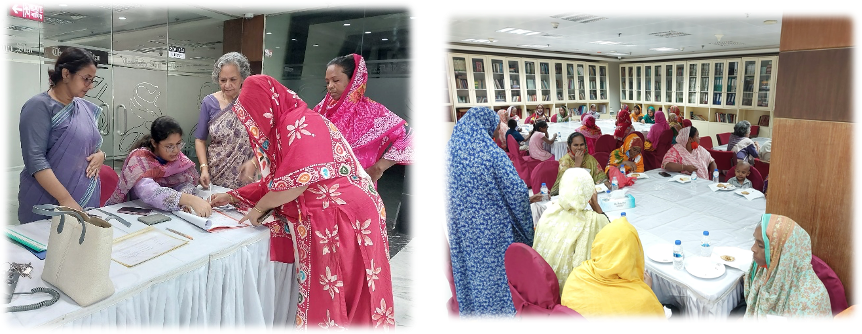
Welcome speech:
The meeting started with a welcome speech by Prof. Ishrat Shamim, President, Centre for Women and Children Studies (CWCS) and the Chair of Advocacy Meeting with the Market Management Committee of Karwan Bazar and Beneficiary Women Traders.
Prof. Shamim addressed the participants by saying: "I would like to welcome the distinguished members of the Market Management Committee, Project Coordinator of the FAME Project representing DWCCI, Creative Lead, The Daily Star and our beneficiary women traders from Karwan Bazar. Thank you all for making the effort to be here today. I believe that these women from such small-scale, informal trading came there in a seminar hall like The Daily Star for the first time. I am happy to see you all in person today for the first time. Under this project we hope to provide some support to improve your economic situation. I have heard that many of you struggle to run your trading properly due to lack of money or resources.”
“The purpose of today’s advocacy meeting is to introduce you to the Market Management Committee, so that if you face any problems, you can confidently approach them directly without hesitation. Often, you might be able to reach out to them more quickly than we can. So we want to build that connection between you and the Market Management Committee. Back in 2006, I conducted a research study on women in market trading at Karwan Bazar where I found firsthand insights about how difficult the situation was for women traders in the marketplace.”
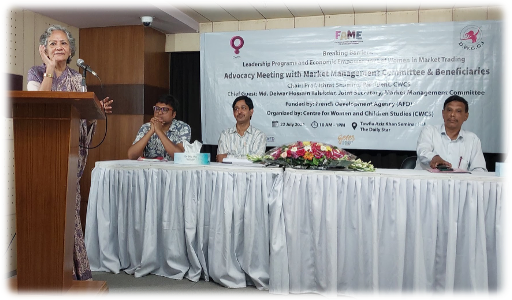
“We have one kind of relationship with the women traders as our beneficiaries, but the Market Management Committee has a different kind of relationship with them, since they are present in the marketplace all the time. Our goal is to help strengthen the connection of women traders with the Market Management Committee so that these women feel comfortable approaching them directly. Also we want the Committee to take the safety and security measures of these women seriously. If anyone tries to evict them from their trading place, where will they go? That’s why today’s meeting is very important to bring these issues forward and work together for future solutions."
Presentation: Role of women in market trading & key findings from Baseline Survey: Khadija Begum, Project Coordinator and Sadia Afrin Hema, Field Officer presented the findings of the Baseline Survey highlighting the economic activities, vulnerabilities, and challenges faced by women traders in Karwan Bazar.
Highlights of the key presentation:

Khadija Begum, Project Coordinator, and Sadia Afrin Hema, Field Officer, presented key findings from the Baseline Survey conducted under the project. The women were chosen based on their business experience, market presence, and social vulnerability. Most of them are involved in small-scale trading like vegetables, tea, spices, fish etc. The survey revealed that many of them face personal challenges, with limited education where 31.7 percent are illiterate and only one has completed higher secondary education. Financially, most women run businesses with very low capital, often below Taka 1500. Major challenges they face include lack of capital (93.3%), insecurity (83.3%), harassment (50%), poor infrastructure, and limited skills in managing their businesses.
The findings stressed the urgent need for safer market spaces, regular support, and greater inclusion of women in decision-making. The presentation concluded with a video clip featuring interviews from the baseline survey.
Speeches of Guest Speakers:
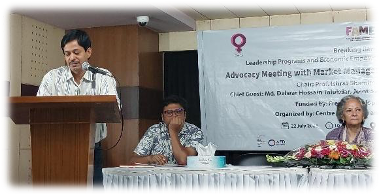 Md. Nasir Uddin, Project Coordinator of the FAME Project
representing the DWCCI emphasized, “Women traders need safe and secure spaces to conduct their
businesses without fear of harassment or encroachment. I urge the Market
Management Committee to extend full support to the 50 selected women traders,
recognizing their potential to contribute meaningfully to their families and
the local economy.”
Md. Nasir Uddin, Project Coordinator of the FAME Project
representing the DWCCI emphasized, “Women traders need safe and secure spaces to conduct their
businesses without fear of harassment or encroachment. I urge the Market
Management Committee to extend full support to the 50 selected women traders,
recognizing their potential to contribute meaningfully to their families and
the local economy.”
On behalf of DWCCI and the FAME Project, “I would like to congratulate CWCS for their hard work and commitment, and the women traders for their determination and courage. CWCS is setting an example for others and showing that women can lead and succeed in business when given the right opportunities. DWCCI remains committed to supporting initiatives that empower women economically and help them take leadership roles in their communities.”
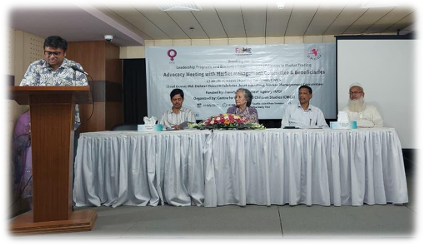 Shuvom Khan, Creative Lead, The Daily Star was present at the meeting as one of
the guests who have emphasized the importance of inclusive market environments
and women’s contributions to the informal market trading. He especially
addressed the women traders in his speech and said, “Two things are necessary
for achieving success; one is support and the other is will power to grow. As
you said the place you are trading is not any authorized place, you are working
in front of their shops, so they are supporting you otherwise you won't be able
to continue it. Also now CWCS is there for you to support your trading. You are
privileged that you are now under this project. You have to dream and dream
big. You have to dream of having a business of 2 lakhs in the near future.”
Shuvom Khan, Creative Lead, The Daily Star was present at the meeting as one of
the guests who have emphasized the importance of inclusive market environments
and women’s contributions to the informal market trading. He especially
addressed the women traders in his speech and said, “Two things are necessary
for achieving success; one is support and the other is will power to grow. As
you said the place you are trading is not any authorized place, you are working
in front of their shops, so they are supporting you otherwise you won't be able
to continue it. Also now CWCS is there for you to support your trading. You are
privileged that you are now under this project. You have to dream and dream
big. You have to dream of having a business of 2 lakhs in the near future.”
“The biggest truth right now is you all are living by your own trading. However the struggle is, you are earning in an honest way not doing anything unethical. And so I believe you have the will power to grow better. I hope you will be able to do it as CWCS is beside you.”
Voices of the Women Traders:
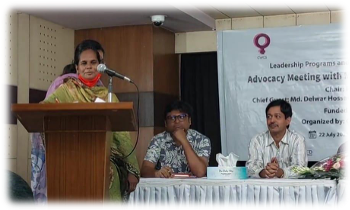 Shefali, fish seller: “I came to Karwan Bazar 25–30 years
ago from Faridpur after losing my parents as a child, and since then I’ve been
struggling alone, doing whatever work I could to survive. Now looking after my
sick husband and managing our family expenses by selling fish. Life has been
hard and lonely, but if I receive any support from your initiative, it could
bring me a little hope and help me live with dignity.”
Shefali, fish seller: “I came to Karwan Bazar 25–30 years
ago from Faridpur after losing my parents as a child, and since then I’ve been
struggling alone, doing whatever work I could to survive. Now looking after my
sick husband and managing our family expenses by selling fish. Life has been
hard and lonely, but if I receive any support from your initiative, it could
bring me a little hope and help me live with dignity.”
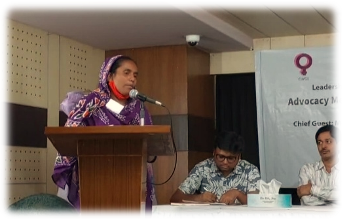 Nargis, vegetable seller: “I sell vegetables at Karwan Bazar
to support my family. I grew up poor, without an education, and later faced
problems in my marriage. I came to Dhaka and chose to do what my mother did to
sell vegetables. I decided to work and stand on my own feet. The Market
Management Committee helped me a lot. Without their support, I couldn't have
found a place to trade in front of the shops. When the city corporation tried
to evict us, a Market Management Committee member, Bulu Chairman, stood by us.
He told us to come to the market balcony if anyone harassed us again. His
support gave me courage.”
Nargis, vegetable seller: “I sell vegetables at Karwan Bazar
to support my family. I grew up poor, without an education, and later faced
problems in my marriage. I came to Dhaka and chose to do what my mother did to
sell vegetables. I decided to work and stand on my own feet. The Market
Management Committee helped me a lot. Without their support, I couldn't have
found a place to trade in front of the shops. When the city corporation tried
to evict us, a Market Management Committee member, Bulu Chairman, stood by us.
He told us to come to the market balcony if anyone harassed us again. His
support gave me courage.”
“I believe if women do business, we can live independently and support our families better. I work alongside my husband and contribute to the household. That gives me pride. People in the market have helped us a lot, and without them, I wouldn't have been able to continue my business.”
Open discussion:
Some of the women have shared their opinions during the open discussion highlighting their struggles and also their gratitude to get the place to share their opinions in the presence of the Market Management Committee.
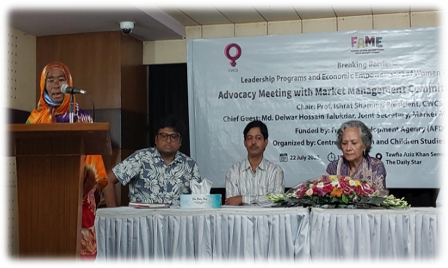 Ambia, tea, betel leaf and cigarette seller: “I have lived a life full of
struggle and loneliness from working unpaid in others' homes to now surviving
alone by selling betel leaves, and cigarettes beside the rail line of Karwan
Bazar, with no family, no address, and no one to call my own. Today, I have
come to this meeting not just to share my pains, but also to be heard and to
remind myself that I still exist.”
Ambia, tea, betel leaf and cigarette seller: “I have lived a life full of
struggle and loneliness from working unpaid in others' homes to now surviving
alone by selling betel leaves, and cigarettes beside the rail line of Karwan
Bazar, with no family, no address, and no one to call my own. Today, I have
come to this meeting not just to share my pains, but also to be heard and to
remind myself that I still exist.”
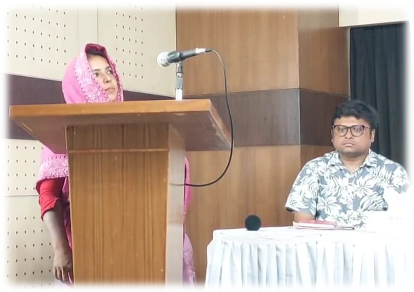 Akhi, tea, betel leaf and cigarette
seller: “I
have a daughter. I struggled but I still continued my daughter’s education. I
used to work as a domestic help to manage my household expenses. Then I thought
of having my own business and started selling betel leaves and cigarettes.
Recently, one day while trading on the roadside, I met with Khadija apa and she
took my name for this program. I hope it will be helpful for us if you help us
with our trading. We are fortunate to be here today and I am grateful to all of
you.”
Akhi, tea, betel leaf and cigarette
seller: “I
have a daughter. I struggled but I still continued my daughter’s education. I
used to work as a domestic help to manage my household expenses. Then I thought
of having my own business and started selling betel leaves and cigarettes.
Recently, one day while trading on the roadside, I met with Khadija apa and she
took my name for this program. I hope it will be helpful for us if you help us
with our trading. We are fortunate to be here today and I am grateful to all of
you.”
Members of the Market Management Committee acknowledged the issues and expressed willingness to explore feasible solutions for space allocation and enhanced safety measures.
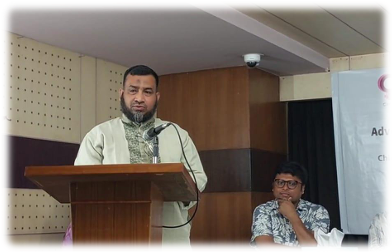 Anwar Hossain, Member, No 1 DIT market, Market Management
Committee, Karwan Bazar: “On behalf of all these women whom CWCS have selected under
this project, we look forward to CWCS that they will share their stories more
widely. These women always face harassment, humiliation and extortion at the
marketplace. Governments change but extortionists never change. They just change their face but continue
their harassment and extortion. We want CWCS to bring these struggles to the
mainstream media. In addition, I want CWCS to manage fixed trading space from
the Dhaka City Corporation for these women traders. There are the spaces in the
porch of the markets that are leased. But these women cannot manage those
spaces. If CWCS can manage such spaces for them, it will be the best solution
for their trading at the marketplace.”
Anwar Hossain, Member, No 1 DIT market, Market Management
Committee, Karwan Bazar: “On behalf of all these women whom CWCS have selected under
this project, we look forward to CWCS that they will share their stories more
widely. These women always face harassment, humiliation and extortion at the
marketplace. Governments change but extortionists never change. They just change their face but continue
their harassment and extortion. We want CWCS to bring these struggles to the
mainstream media. In addition, I want CWCS to manage fixed trading space from
the Dhaka City Corporation for these women traders. There are the spaces in the
porch of the markets that are leased. But these women cannot manage those
spaces. If CWCS can manage such spaces for them, it will be the best solution
for their trading at the marketplace.”
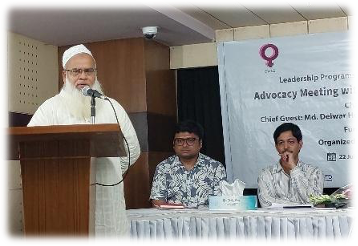 Md Nurujjaman, Advisor, No 2
building, Market Management Committee: “I appreciate and support this
commendable initiative of CWCS for working with these vulnerable women traders.
Since 1972, I have been doing business at Karwan Bazar. I know these women
sitting before us who are continuously doing very hard work and struggling to
buy raw materials and sell them in the market. They usually come early in the
morning and close trading around 10 pm at night. They trade on the road for
about 16-17 hours. These women trade in front of our shops, sometimes the shop
owners complain to us saying why we do not evict them from this place as it is
causing problems for them. Sometimes, we behave inappropriately with them
depending on the situation; but then we reflect that if they were our
relatives, how would we treat them? Understanding their condition, we try to
help them either openly or privately. There are 342 shops in no 2 market
building. Karwan Bazar is a place where even if someone arrives after starving
for 2–3 days, they would not go back hungry. Trading goes on 24 hours a day,
and in fact, the volume of trade at night is even higher than during the day.
Lastly, I want to thank CWCS, especially Prof Ishrat madam for her great
enthusiasm for working with these women traders.”
Md Nurujjaman, Advisor, No 2
building, Market Management Committee: “I appreciate and support this
commendable initiative of CWCS for working with these vulnerable women traders.
Since 1972, I have been doing business at Karwan Bazar. I know these women
sitting before us who are continuously doing very hard work and struggling to
buy raw materials and sell them in the market. They usually come early in the
morning and close trading around 10 pm at night. They trade on the road for
about 16-17 hours. These women trade in front of our shops, sometimes the shop
owners complain to us saying why we do not evict them from this place as it is
causing problems for them. Sometimes, we behave inappropriately with them
depending on the situation; but then we reflect that if they were our
relatives, how would we treat them? Understanding their condition, we try to
help them either openly or privately. There are 342 shops in no 2 market
building. Karwan Bazar is a place where even if someone arrives after starving
for 2–3 days, they would not go back hungry. Trading goes on 24 hours a day,
and in fact, the volume of trade at night is even higher than during the day.
Lastly, I want to thank CWCS, especially Prof Ishrat madam for her great
enthusiasm for working with these women traders.”
Speech of Chief Guest:
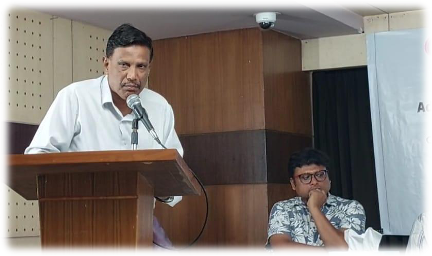 Chief Guest, Md Delwar Hossain
Talukdar, Joint Secretary, Market Management Committee: “First, I must mention that what
makes me happy is that the 50 women traders selected by Khadija and Sadia, have
all been trading in the market for a long time, many for 20 to 30 years. I do
not see anyone here who joined the marketplace just 2 or 6 months ago. So, I
must say, the selection is truly appropriate.”
Chief Guest, Md Delwar Hossain
Talukdar, Joint Secretary, Market Management Committee: “First, I must mention that what
makes me happy is that the 50 women traders selected by Khadija and Sadia, have
all been trading in the market for a long time, many for 20 to 30 years. I do
not see anyone here who joined the marketplace just 2 or 6 months ago. So, I
must say, the selection is truly appropriate.”
“I have been representing the Market Management Committee for 40 years, and during this time, I have seen these women face countless forms of hardship. I have known many of them since they were children, yet their lives have hardly changed. Their parents were involved in market trading, they are doing the same, and now even their children are following the same path. They have not been able to break this cycle because they had no proper guidance.”
“Over the years, many NGOs have come, given some money, and then left. Some even tried to deceive them by offering support at first, only to trap them later with interest-bearing loans. Finally, I want to conclude by saying that this initiative of helping these vulnerable women is undoubtedly thoughtful. I hope this project will be extended thus more women could be helped to have a dignified life for themselves. We stand beside every woman in the marketplace. If any challenge arises, bring it to us we are committed to act swiftly and ensure a safer, more inclusive trading environment."
Closing Remarks & Vote of Thanks:
Prof. Ishrat Shamim, President, CWCS concluded the meeting with her closing remarks and vote of thanks. She mentioned: “When I first came up with the idea of starting this project in Karwan Bazar, I thought if I am going to work there, then of course there must be a Market Management Committee with whom I need to get involved. They are the ones who are always there to monitor the marketplace and maintain a healthy trading environment. I envision that we have to introduce our beneficiary women traders with the members of the Market Management Committee from the very beginning of the project.”
“Today, after coming here, I realized that the Committee members have known the women traders for a long time and it is really appreciable. The women traders have all been working in this marketplace for many years, and so have the Committee members. There is already a good connection between them. When I first shared this project idea with others, many people said, 'Apa, are you sure you want to work with these women? What if they do not stay with you? What if they leave?' I would reply, ‘If they leave, there is nothing we can do. But as long as they are here, we will try our best to support them.”
“Initially, we had planned to provide necessary materials and equipment to enhance their trading. We wanted the support to be meaningful and lasting.”
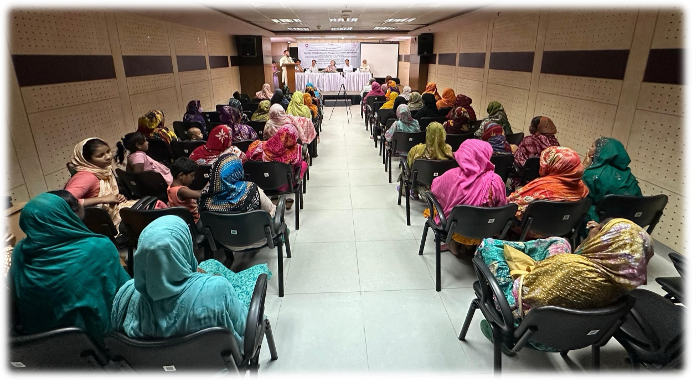
News coverage of the Advocacy Meeting
1. হয়রানিমুক্ত ব্যবসার উপযোগী পরিবেশ নিশ্চিত করার পক্ষে সমর্থন গড়ে তোলা, প্রকাশিত: ১৯:২৩, ২২ জুলাই ২০২৫. Avaiable at: https://www.womeneye24.com/national/news/114149
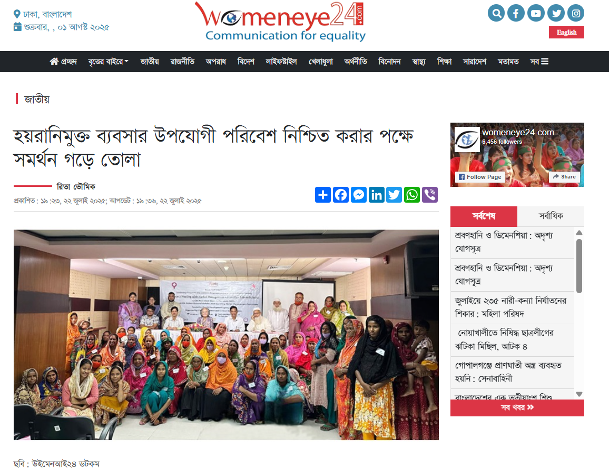
2. হয়রানিমুক্ত ব্যবসার উপযোগী পরিবেশ গড়ে তোলার আহ্বান, প্রকাশিত: জুলাই ২৩, ২০২৫. Available at: https://hellobd.news/corporate-news/43859
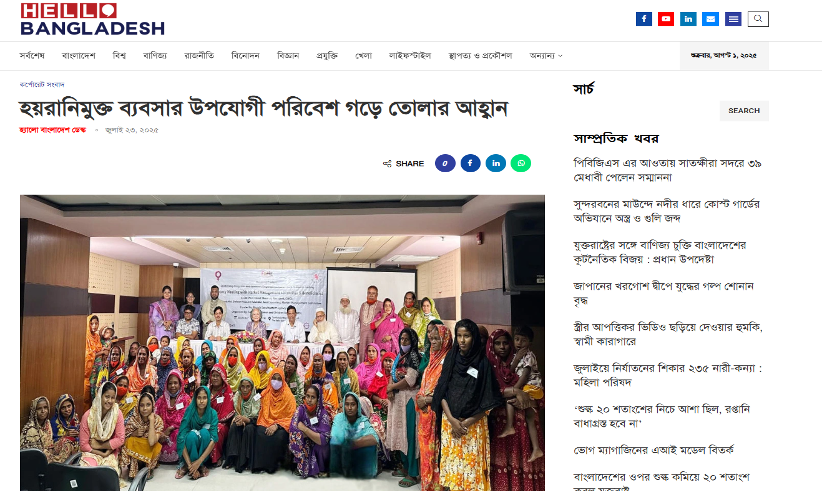
3. Women’s empowerment takes center stage in “Dhaka Market Advocacy” July 23, 2025 Available at: https://thegoodnewsglobal.com/breaking-barriers-women-market-safety-dhaka/
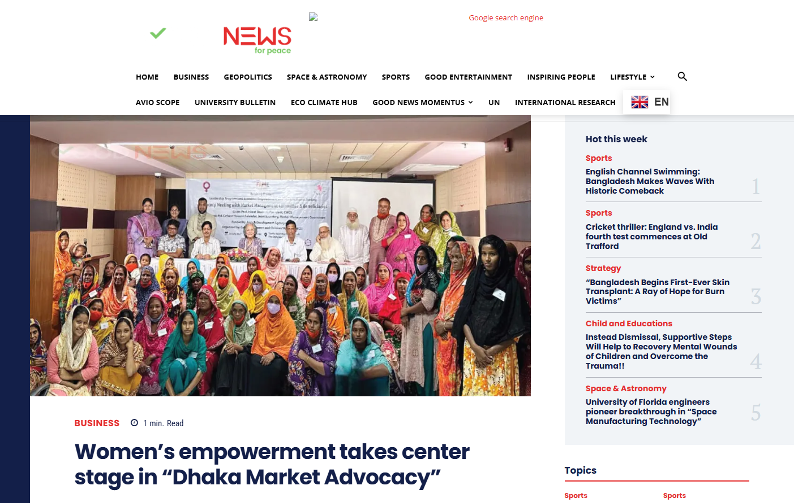
● 2-days Skill Training for Women Traders on Gender Equality, Women Rights, Leadership and Business Plan for Economic Empowerment
The 2-days Skill Training for Women Traders on Gender Equality, Women Rights, Leadership and Business Plan for Economic Empowerment was organized by Centre for Women and Children Studies (CWCS) on 5-6 August 2025 at Seminar Room, Universal Tutorial School, Dhaka.
Training of Day 1:
The training started with the introduction and welcome note by Prof. Ishrat Shamim, President, CWCS. In her speech dedicated to the women traders, she said: “You are skilled, hardworking women who are running your own businesses. You are not poor. The real problem is that we, as a society, often fail to plan and support you in the right way. That is what we are here to make a change.”
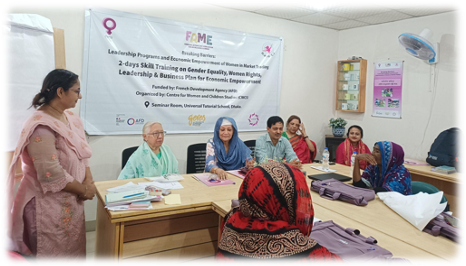 “It is important that you also know the rules
of business, how to run your trade independently and sustainably. We are here
to support you, but we cannot decide everything for you. You need to think
carefully about what materials and resources you need to grow your business.
Once you identify those needs, we will do our best to assist you.”
“It is important that you also know the rules
of business, how to run your trade independently and sustainably. We are here
to support you, but we cannot decide everything for you. You need to think
carefully about what materials and resources you need to grow your business.
Once you identify those needs, we will do our best to assist you.”
“I believe, if we work together, we can make sure you get a safe and respectful space in the marketplace where you can run your business with dignity. I hope you will stay with us on this journey. This is not just a project, it is a movement for women’s rights and economic empowerment.”
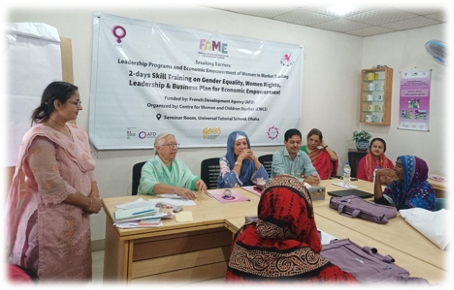 Nusrat Sultana, Treasurer, CWCS highlighted in her speech: “At CWCS, we always think with a
women-friendly and ambitious mindset. We believe that women like you have
immense potential, and it is our responsibility to turn our thoughts and ideas
into reality, by working hand in hand with you.”
Nusrat Sultana, Treasurer, CWCS highlighted in her speech: “At CWCS, we always think with a
women-friendly and ambitious mindset. We believe that women like you have
immense potential, and it is our responsibility to turn our thoughts and ideas
into reality, by working hand in hand with you.”
In this business journey, managing finances and understanding accounts is very important. We will try our best to guide you on these topics so that you can improve your business, manage your earnings better, and move forward independently.
We are here to support you, but the main role will be yours because your growth is in your own hands. Together, we will strive to make your businesses stronger and your future brighter.”
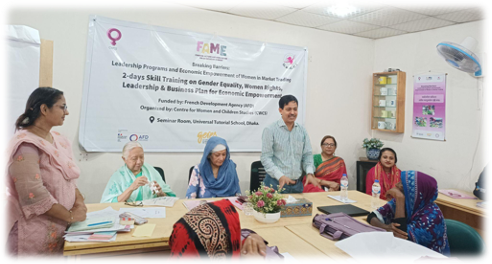 Speech of Md Nasir Uddin, Project Coordinator, FAME, DWCCI, “I would like to express my sincere gratitude
to Professor Ishrat Shamim Madam and CWCS team for taking on such a significant
challenge and leading this important initiative. She has undertaken the
responsibility of working on your rights and creating awareness about your
businesses.
Speech of Md Nasir Uddin, Project Coordinator, FAME, DWCCI, “I would like to express my sincere gratitude
to Professor Ishrat Shamim Madam and CWCS team for taking on such a significant
challenge and leading this important initiative. She has undertaken the
responsibility of working on your rights and creating awareness about your
businesses.
It is commendable that CWCS has committed to ensuring the safety and security of women traders in the market. I deeply appreciate their dedication and efforts. I sincerely hope this initiative will achieve its objectives and bring success in empowering women in market trading.”
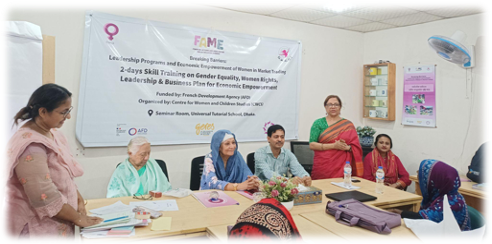 Message from Trainer, Fawzia Khondker during the welcome session, “It is a great opportunity for me to be here
and listen to your stories and experiences. I want to emphasize that you must
stay united and support one another. Without unity, we cannot move forward
together. Only through collective strength and solidarity can we overcome
challenges and achieve success.”
Message from Trainer, Fawzia Khondker during the welcome session, “It is a great opportunity for me to be here
and listen to your stories and experiences. I want to emphasize that you must
stay united and support one another. Without unity, we cannot move forward
together. Only through collective strength and solidarity can we overcome
challenges and achieve success.”
Icebreaking:
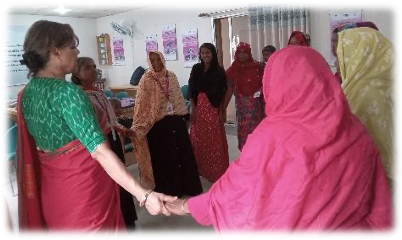 The trainer started the training with an
interactive game as an icebreaker making a circle and holding hands together.
The participants introduced themselves by sharing their names and the type of
trading they are involved through this simple and engaging activity. It helped
to know each other, relax, and feel more comfortable before a training session.
The trainer started the training with an
interactive game as an icebreaker making a circle and holding hands together.
The participants introduced themselves by sharing their names and the type of
trading they are involved through this simple and engaging activity. It helped
to know each other, relax, and feel more comfortable before a training session.
Session 1: Understanding Gender Equality
The session began with an interactive introduction to the concept of gender equality, designed specifically for women with limited or no formal education. The trainer initiated the discussion by exploring the identity of women and highlighting the multiple roles they play in their families and communities such as mothers, wives, daughters, caregivers, and earners.
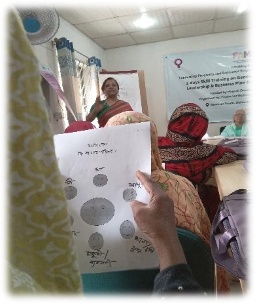 To make the session engaging and relatable,
the trainer distributed picture cards among the participants. Each trainee was
asked to identify and share the roles they perform in their families. This
opened up a space for self-reflection and empowerment.
To make the session engaging and relatable,
the trainer distributed picture cards among the participants. Each trainee was
asked to identify and share the roles they perform in their families. This
opened up a space for self-reflection and empowerment.
One of the participants, Shathi, who runs a small tea and betel leaf stall in the marketplace, shared proudly, “We may have different personal roles, but one identity we all share is that we are businesswomen.” This powerful statement resonated with the group and helped the participants feel united in their economic contributions.
Another participant, Mukta Nesa, who sells fish oil and scales, shared a painful personal experience saying, “When a boy is born, everyone celebrates but when my daughter was born, no one was happy. It felt like a curse. This kind of discrimination still exists in our society.” Her words reflected the deep-rooted gender bias that many women in the group could also acknowledge.
Following these emotional and insightful discussions, the trainer facilitated a group dialogue on the similarities and differences between men and women focusing on equal rights, value, and potential, while also addressing the social and cultural barriers that hinder women's full participation. The session created a supportive and respectful environment where the women could openly share their lived realities, recognize their strengths, and begin to see themselves not just as survivors, but as capable individuals and entrepreneurs.
Session 2: Women’s Rights in Everyday Life
The second session focused on raising awareness about women’s rights in everyday situations, both at home and in the marketplace. The trainer began by asking a simple question: “What do you understand by rights?”
Participants were encouraged to share their thoughts, and many expressed what they believed their rights to be such as the right to speak, to work, and to be treated with respect. This open discussion allowed everyone to feel heard and helped set the foundation for understanding their rights more deeply. During the discussion, some women traders shared their personal experiences from the marketplace.
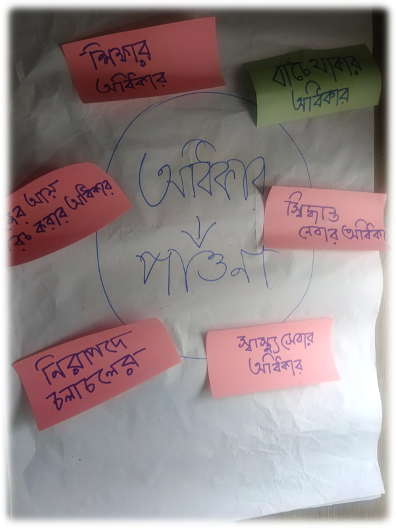 Mst. Ambia Khatun, a tea stall and betel leaf
seller, said with deep frustration, “Some people do not respect us. They treat
us rudely and even force me out from the place where I try to earn my living.”
Mst. Ambia Khatun, a tea stall and betel leaf
seller, said with deep frustration, “Some people do not respect us. They treat
us rudely and even force me out from the place where I try to earn my living.”
To help the women better understand their rights in real-life situations, the trainer organized a role-play exercise. Participants were divided into three small groups. Each group was given a scenario based on common challenges faced by the women in the marketplace while trading.
After the role plays, the participants gathered to reflect on what they had acted out. The session ended with positive reinforcement from the trainer, encouraging all women to be aware of their rights and to support each other as a community, especially in public spaces like the marketplace.
Session 3: Building Confidence & Voice
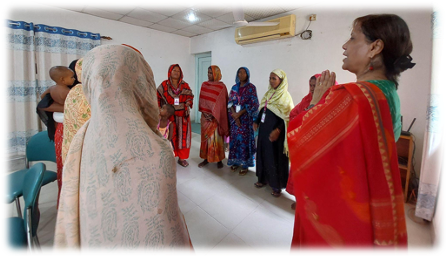 In this session, the trainer helped the women
believe in their own abilities and practice speaking with confidence. The
trainer guided them to write down their strengths. Each woman drew a picture
that represented her strengths and shared what she was good at. After they
shared, the facilitator reinforced the message, “You are a leader in your own
way.”
In this session, the trainer helped the women
believe in their own abilities and practice speaking with confidence. The
trainer guided them to write down their strengths. Each woman drew a picture
that represented her strengths and shared what she was good at. After they
shared, the facilitator reinforced the message, “You are a leader in your own
way.”
After this trainer stands in a circle with the trainee. Each woman says her name and what she sells in a loud voice. Everyone celebrates each one loudly with applause. Then the facilitator invites participants to reflect and share their thoughts like: “What stops us from speaking?” Participants discuss the barriers, fears, or challenges that prevent them from expressing themselves.
“What happens when we do?” Participants shared the positive changes, outcomes, or impacts that occur when they find their voice and speak up.
The facilitator encourages open dialogue, ensures everyone has the opportunity to contribute, and summarizes key points from the discussion to highlight the importance of speaking with confidence.
Session 4: Leadership in Practice
The trainer divided participants into small groups and given real-life situations to act out. Each group performed their scenario, followed by a group discussion. The activity encouraged the women to think critically, express themselves, and practice leadership in a safe and supportive setting.
After each role play, the trainer facilitated a discussion to reflect on the experience, focusing on what makes a good leader. Shiuli, a tea stall and betel leaf seller, shared her view: “A leader is someone who can find solutions to certain problems.” Shathe, also a tea stall and betel leaf seller, added: “A leader is someone who can give good advice in any situation.”
Action Planning:
In this session, the facilitator invites each woman to complete the sentence, either verbally or by selecting a picture that represents her answer: “From tomorrow, I will…”
The facilitator provides a few examples to inspire participants:
● “Speak up when I’m not treated fairly.”
● “Help another woman.”
● “Teach my daughter she can lead too.”
Then the facilitator gave them some work to think about at home and asked them to share it the next day. After this activity then group clap for each woman and take group photos.
Training of Day 2:
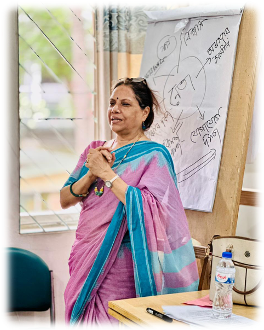 The second day of training began with an
icebreaking session, where all the women, along with the trainer, sang songs
together and warmed up to focus on the day’s session. At the beginning trainer recapped the discussion
from day-1 and also reminded everyone: “Living itself is joy, no matter how
much hardship or struggle we face, we will live on. Together we sing, together
we create joy, and together we shape our lives.”
The second day of training began with an
icebreaking session, where all the women, along with the trainer, sang songs
together and warmed up to focus on the day’s session. At the beginning trainer recapped the discussion
from day-1 and also reminded everyone: “Living itself is joy, no matter how
much hardship or struggle we face, we will live on. Together we sing, together
we create joy, and together we shape our lives.”
Session 1: What Is a Business Plan?
In this session trainers help the women traders to understand the 4 basic parts of a micro business plan. She asked the women to think about these 4 questions: what do I sell ? What do I need to buy? Who will buy these from me? and How do I earn?
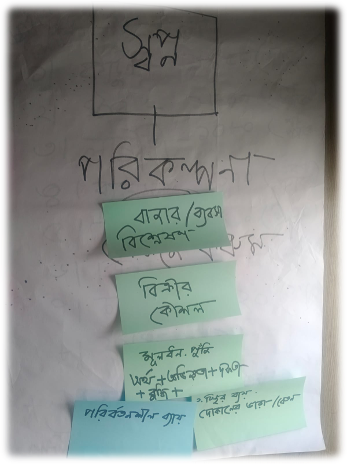 Then she said, “We need to have a plan for our
trading. Without planning we will not be able to grow.” The trainer briefly
discussed having a business plan.
Then she said, “We need to have a plan for our
trading. Without planning we will not be able to grow.” The trainer briefly
discussed having a business plan.
The trainer emphasized starting with a clear dream of what you want to achieve. Once you have a dream, you must create a plan to turn it into reality. This begins with analyzing the market to understand where and how to set up your business for the best results. Planning and strategy are essential to attract and retain customers. Investment is also crucial, which includes not only money to purchase goods and cover expenses but also skills to manage operations effectively. By combining vision, planning, market knowledge, strategic thinking, financial resources, and skill development, traders can work towards long-term business success.
Shiuli said, “Yes, if we find any better work to do of course we want to do it and develop our livelihood.”
Sathe said, “There is a free space in front of my house where I live under the flyover and beside the railway station. I was thinking of having my own nursery in front of my house.”
After the discussion, the trainer introduced an activity. Through this activity, the trainer explained that every business is a cycle when we plan carefully, we are able to earn better.
Session 2: Understanding Costs & Profits
In this session, trainers discussed expenses and profit in daily trade. She tried to make the women traders understand that there are 2 types of costs: Fixed cost and Daily cost. We have to keep all these in mind while planning. Fixed costs are house rent, trading equipment which remain constant, and daily costs are like the goods you need to buy on a daily basis, transportation, and daily meals, which vary.
She emphasized that having capital alone is not enough; traders also need effort, market knowledge, experience, and a clear understanding of their trade. It is important to decide who will manage the business whether oneself, a family member, or an employee but the trader must remain actively involved. The trainer also warned about the risks of taking loans or buying assets in someone else’s name, as this can lead to losing ownership if circumstances change. Her key message was that women must ensure they are the rightful owners of their businesses to protect their livelihoods.
Session 3: Managing Money Simply
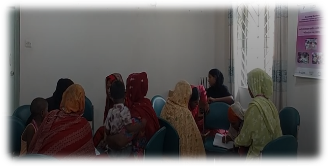 The trainer began by
asking women traders how they would save money. Participants shared their
existing process of managing money. Mst. Selina Akter, a vegetable seller,
said, “I earn Taka 300 every day, but by the end of the week, I have nothing
left.” The trainer arranged an activity called the “Saving Circle.”
Participants practiced dividing a day’s earnings into three parts: for family,
for business and for savings. The trainer then explained to them about banking
savings systems and mobile savings systems.
The trainer began by
asking women traders how they would save money. Participants shared their
existing process of managing money. Mst. Selina Akter, a vegetable seller,
said, “I earn Taka 300 every day, but by the end of the week, I have nothing
left.” The trainer arranged an activity called the “Saving Circle.”
Participants practiced dividing a day’s earnings into three parts: for family,
for business and for savings. The trainer then explained to them about banking
savings systems and mobile savings systems.
Session 4: Plan for Improving Their Business
In this session, the trainer divided the participants into three groups according to their business patterns. Each group was assigned the task of identifying what they needed to improve their ongoing businesses. The participants discussed their challenges and brainstormed possible solutions within their groups.
After completing the group work, each group presented their findings to the entire session. They explained the areas of improvement they had identified, and the resources required.
Following the presentations, each participant worked individually to prepare a budget based on their specific needs. This activity helped them develop a clear, need-based plan for improving their businesses. The women traders suggested the materials they need to enhance their current trading.
Certificate giving ceremony
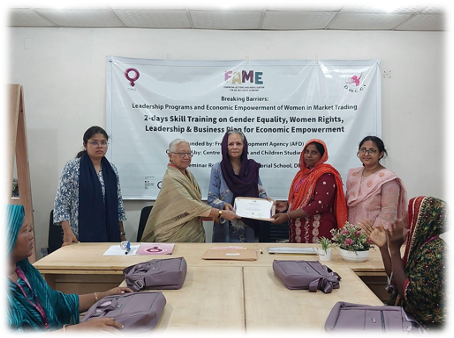
The training ended by providing certificates to all the participant women traders by Nusrat Sultana, Treasurer, CWCS and Prof. Ishrat Shamim, President, CWCS. During the closing of the training, the President encouraged the women to always speak for their rights and work for enhancing their lifestyle through the betterment of their trading.
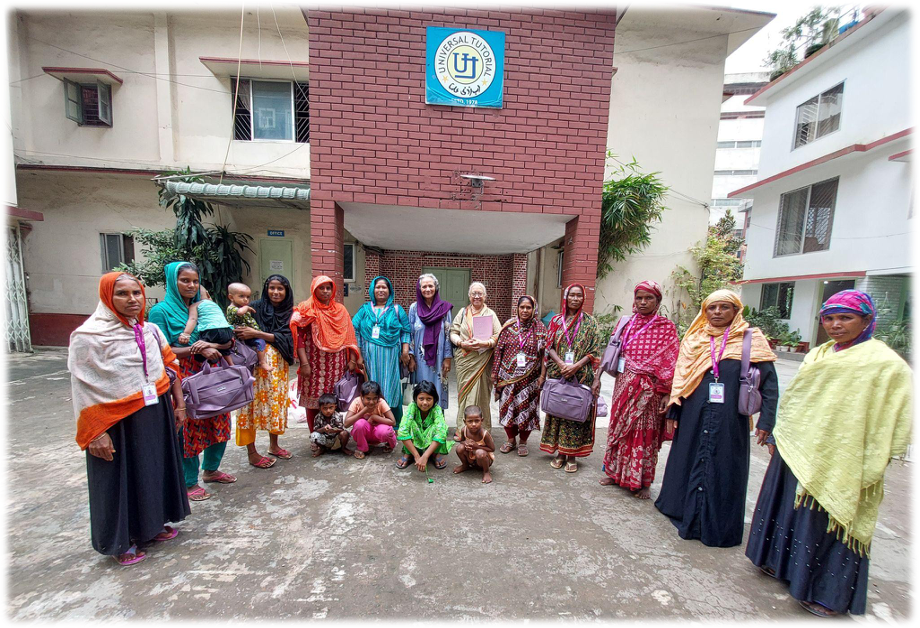
Group picture of the participants
